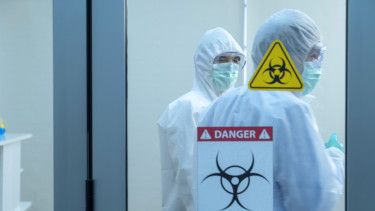Scientists discuss possibility of new 'super variants' emerging in coronavirus pandemic

It's all Delta now, but...
William Hanage, an epidemiologist at the Harvard TH Chan School of Public Health, compared the situation to a weather report: “It used to be, ‘We have a little bit of Gamma there, we’ve got Alpha coming up here.’ But now it’s just Delta.”
Since it was first detected in India in December 2020, the Delta variant of Sars-CoV-2 has become so ubiquitous that it would be easy to assume that the once-rapid evolution of the virus has been replaced by a state of quiescence. According to the World Health Organization, 99.5% of all Covid-19 genomic sequences reported to public databases are now Delta.
... new strains keep emerging
While new strains have continued to emerge, such as the recent AY. 4.2 or the Delta Plus variant in the UK, which scientists estimate to be 10-15% more transmissible, although there is no exact data for this yet, they are almost identical to the Delta variant, apart from the odd minor mutation here and there. Hanage has taken to referring to them as Delta’s grandchildren.
“There’s been quite a few Delta Pluses,” he told The Guardian. “I did a recent radio interview where I said that Delta Plus is code for whatever people are getting their knickers in a twist about at the moment. It’s not gigantically more transmissible.”
Super variants will emerge
Ravi Gupta, professor of clinical microbiology at the University of Cambridge, refers to these strains as “super variants” and says he is 80% sure that another one will emerge. The question is when.
This new Delta Plus variant is relatively wimpy compared to the kind of thing I’m talking about.
"It has two mutations from the Delta strain, I don’t think they are that worrisome and it hasn’t taken off in a big way in other countries. But it’s inevitable that there will be another significant variant in the next two years and it will compete with Delta and it may out-compete Delta.”
During the latter half of 2020, epidemiologists began to observe signs of a concerning phenomenon known as viral recombination, in which different versions of Sars-CoV-2 exchanged mutations and combined to form a totally new strain.
Thankfully, Gupta says recombination does not appear to be that common, but it remains one feasible source of a new super variant, particularly in parts of the world where sizable proportions of the population remain unvaccinated and viral strains can circulate freely.
“Now that Delta is overwhelmingly the key virus, this has become less likely,” he says.
But there are large swaths of the planet that we’re not sampling and we don’t know what’s going on. So it is a very real possibility.
The second is a series of major mutations, either resulting in a greatly enhanced version of Delta or something very different. It is thought there remains significant scope for this to happen.
“While recent variants are versions of Delta, the virus has huge potential to evolve in the future,” says Gideon Schreiber, professor of biomolecular sciences at the Weizmann Institute of Science in Israel. “More complex mutations can evolve, with simultaneous mutations at more than one position, which may be more problematic.”
Gupta says that a greater problem, and one more likely to lead to a super variant, is the persistently high infection rate in countries such as the UK, due to the ability of Delta to transmit between vaccinated individuals.
“The more infections there are per day, the more chance that there is someone out there, a patient X, who gets infected and their T-cells are not strong enough to clear the infection because they’re immune-suppressed,” he says.
“So they end up having the infection over a number of days; they’ve got some antibodies knocking around because they’ve had a partial vaccine response and the virus learns to evade them and then that spills out.”
Earlier this year, Gupta published a paper that showed that this process could occur in severely ill patients who had been administered convalescent plasma laden with virus-killing antibodies.
Epidemiologists are now trying to model what a new super variant might look like. So far, the major transformations in the virus have helped to increase its transmissibility. Hanage explains that one of the reasons why the Delta variant had such an impact is because it grows extremely rapidly within human cells, before the immune system kicks into gear. As a result, people infected with Delta carry approximately 1,200 times more viral particles in their noses compared with the original Sars-CoV-2 strain and develop symptoms two to three days sooner.
“The strains of the virus that end up surviving and becoming dominant vary, depending on which stage of the pandemic you’re in,” says Hanage. “So far, it’s been much more important for the virus to be transmitting effectively into the remaining pool of unprotected people. But that is expected to change around about now.”
It's not all doom and gloom, but vaccines alone are not enough
While this might sound a little terrifying, it’s not all bad news. Because the Covid-19 vaccines are designed with viral evolution in mind, epidemiologists do not expect any new super variant to render them completely useless and so it would be extremely unlikely to lead to large serious outbreaks, such as those of the past two years.
In addition, there is a second generation of Covid-19 vaccines that have been developed.
But epidemiologists also believe that relying on vaccines alone is not enough.
Gupta says that even as we attempt to find a way to live with Covid-19 in the UK, there should still be some restrictions in place to limit the spread of the virus and reduce the number of opportunities it gets to mutate.
“The case numbers are so high at the moment that it’s much better to prevent new infections,” says Gupta.
In other words, we shouldn’t be wandering around in crowded places, in buildings without masks on, even though it’s hard to do.
"If you look at the variants we’ve had, they have all emerged in countries with very high, uncontrolled transmission – India, the UK, Brazil."
There’s a reason why we haven’t heard of a Singaporean or South Korean variant.
It is a philosophy many of his colleagues agree with. “You want to limit the number of opportunities that the virus gets to roll the dice,” says Hanage. “With natural selection, you’re basically talking about the most creative force that we know of when it comes to solving problems. It’s amazing. And so this is why you’d never bet against it. We expect the virus to keep evolving.”
Cover photo: Getty Images







